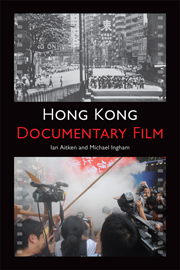Book contents
- Frontmatter
- Contents
- Introduction
- 1 Hong Kong, Britain, China: The Documentary Film, 1896–1941, A Page of History (1941) and The Battle of Shanghai (1937)
- 2 Hong Kong, Britain, China: The Documentary Film, 1947–69, the ‘Picturesque’ Committed Film and Water Comes over the Hills from the East (1965)
- 3 Colonial Film: The Development of Official Film–making in Hong Kong, 1945–73, the Hong Kong Film Unit (1959–73) and This is Hong Kong (1961)
- 4 Public-service Broadcasting in an Authoritarian Setting: The Case of Radio Television Hong Kong and the Development of Television Documentary Film in Hong Kong
- 5 The Documentary Films of Radio Television Hong Kong (RTHK) and The Hong Kong Case (1989)
- 6 Aesthetics and Radicalism: An Overview of Independent Documentary Film in Hong Kong, 1973–2013
- 7 A Critical Analysis of Significant Independent Documentary Films of the Past Three Decades
- Conclusions: The Future of Independent Documentary Film in Hong Kong, China and the Region
- Bibliography
- Index
4 - Public-service Broadcasting in an Authoritarian Setting: The Case of Radio Television Hong Kong and the Development of Television Documentary Film in Hong Kong
Published online by Cambridge University Press: 05 September 2014
- Frontmatter
- Contents
- Introduction
- 1 Hong Kong, Britain, China: The Documentary Film, 1896–1941, A Page of History (1941) and The Battle of Shanghai (1937)
- 2 Hong Kong, Britain, China: The Documentary Film, 1947–69, the ‘Picturesque’ Committed Film and Water Comes over the Hills from the East (1965)
- 3 Colonial Film: The Development of Official Film–making in Hong Kong, 1945–73, the Hong Kong Film Unit (1959–73) and This is Hong Kong (1961)
- 4 Public-service Broadcasting in an Authoritarian Setting: The Case of Radio Television Hong Kong and the Development of Television Documentary Film in Hong Kong
- 5 The Documentary Films of Radio Television Hong Kong (RTHK) and The Hong Kong Case (1989)
- 6 Aesthetics and Radicalism: An Overview of Independent Documentary Film in Hong Kong, 1973–2013
- 7 A Critical Analysis of Significant Independent Documentary Films of the Past Three Decades
- Conclusions: The Future of Independent Documentary Film in Hong Kong, China and the Region
- Bibliography
- Index
Summary
HISTORICAL SUMMARY: THE ROAD TO THE HANDOVER
During the 1970s, agitation for political reform remained muted amongst the local population in Hong Kong, and no substantive political leadership emerged from within that population to promote such reform. This was partly due to the fact that the local community and its leaders had been kept out of governance and executive authority by the colonial regime for so long that they had become habituated to that circumstance. However, it was also partly because, by the 1970s, the colonial regime was administering Hong Kong fairly well. Following the confrontation of the late 1960s some action had been taken against corruption through the inauguration of the Independent Commission against Corruption in 1974. The rule of law remained sovereign, and largely independent of government. Necessary if still inadequate welfare reforms had been enacted. Social stability now seemed reasonably assured, and the colonial government was finally proving more responsive to the needs of the population. By the mid-1970s Hong Kong was also becoming incrementally more prosperous, and the evidence suggests that this led large sections of the local population to preoccupy themselves more with matters related to family situation and pecuniary advantage than with suffrage. Of course, the colonial presence was still widely resented, but the small-government model which prevailed meant the local community did not have to encounter its existence too recurrently. If that presence also created the framework for local business to succeed, and wealth to accumulate, as seemed to be the case, then the local community were prepared to tolerate it.
- Type
- Chapter
- Information
- Hong Kong Documentary Film , pp. 102 - 143Publisher: Edinburgh University PressPrint publication year: 2014



